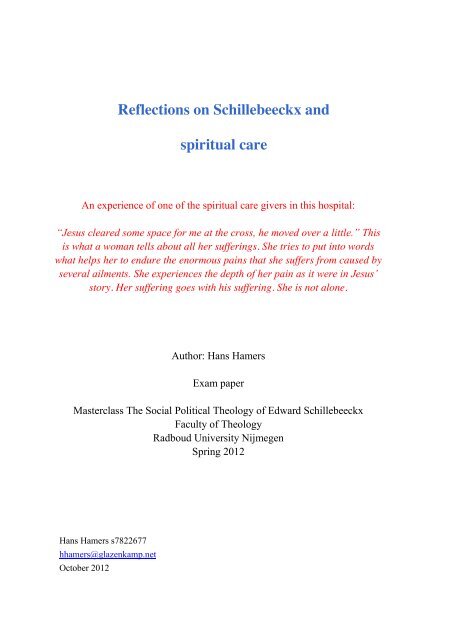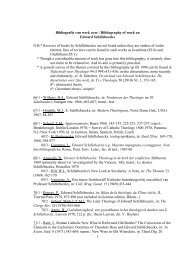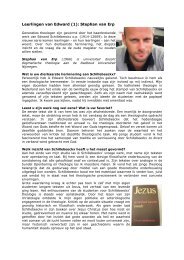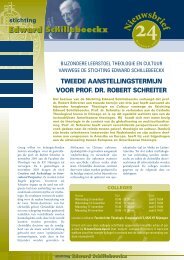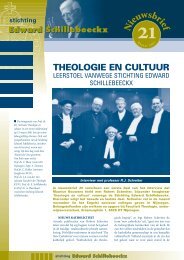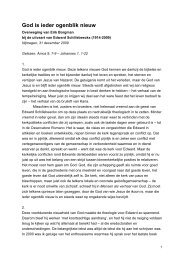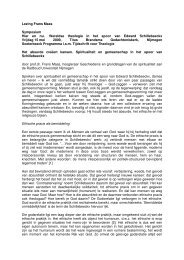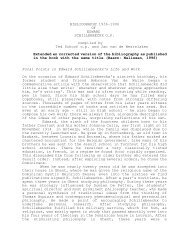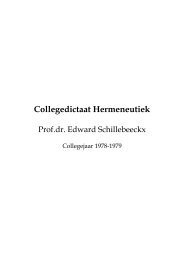Hans Hamers - Stichting Edward Schillebeeckx
Hans Hamers - Stichting Edward Schillebeeckx
Hans Hamers - Stichting Edward Schillebeeckx
You also want an ePaper? Increase the reach of your titles
YUMPU automatically turns print PDFs into web optimized ePapers that Google loves.
Reflections on <strong>Schillebeeckx</strong> and<br />
spiritual care<br />
An experience of one of the spiritual care givers in this hospital:<br />
“Jesus cleared some space for me at the cross, he moved over a little.” This<br />
is what a woman tells about all her sufferings. She tries to put into words<br />
what helps her to endure the enormous pains that she suffers from caused by<br />
several ailments. She experiences the depth of her pain as it were in Jesus’<br />
story. Her suffering goes with his suffering. She is not alone.<br />
Author: <strong>Hans</strong> <strong>Hamers</strong><br />
Exam paper<br />
Masterclass The Social Political Theology of <strong>Edward</strong> <strong>Schillebeeckx</strong><br />
Faculty of Theology<br />
Radboud University Nijmegen<br />
Spring 2012<br />
<strong>Hans</strong> <strong>Hamers</strong> s7822677<br />
hhamers@glazenkamp.net<br />
October 2012
Table of contents<br />
1 INTRODUCTION ............................................................................................................................ 2<br />
2 HUMANITY ................................................................................................................................... 3<br />
2.1 ANTHROPOLOGICAL CONSTANTS .................................................................................................................. 4<br />
3 SUFFERING AND NEGATIVE CONTRAST EXPERIENCE .................................................................... 6<br />
3.1 SUFFERING .............................................................................................................................................. 6<br />
Critical force of suffering ..................................................................................................................... 7<br />
Critical rationality ................................................................................................................................ 8<br />
3.2 NEGATIVE CONTRAST EXPERIENCE ................................................................................................................ 9<br />
4 SPIRITUAL CARE AND THE CRITICAL FORCE OF SUFFERING ......................................................... 10<br />
5 CONCLUDING REMARK ............................................................................................................... 12<br />
BIBLIOGRAPHY ............................................................................................................................................ 13<br />
1
1 Introduction<br />
In this paper I want to connect two things: the social political theology of <strong>Schillebeeckx</strong> and<br />
contemporary spiritual care as practiced in institutions of care, hospitals, and nursing homes.<br />
The overall inspiring question is: can a line be drawn from <strong>Schillebeeckx</strong> to the daily<br />
practice and experiences of spiritual care givers and their patients?<br />
<strong>Schillebeeckx</strong>’ thinking is heavily enacted in the human life, in this world where people live<br />
with their God. 1 So reflections on his theology, from the perspective of concrete practice of<br />
contemporary spiritual care, always in a specific frame of space and time, should make<br />
sense. The leap taken should not be too large.<br />
In this paper the focus will be on the concept of suffering in <strong>Schillebeeckx</strong>’ social political<br />
theology and on human suffering of hospital patients. Related concepts like the meaning and<br />
sense of life, negative contrast experience, humanity and human condition, are discussed<br />
when needed.<br />
Let me start with a general observation, taken from my own practice as a spiritual care giver<br />
in the university hospital. In contact with patients I often hear their anger and indignation,<br />
their worries about lack of social justice in their own community, their church, the nation<br />
they belong to, and even the world order of which they are part of. Sometimes people are<br />
emotional when they talk about this. In a way it seems to move them although the people it<br />
concerns are completely unknown to them. Are they giving word and expression to what<br />
they sense as a way out? A strong ‘No’ to the suffering, the evil they see, hear and<br />
experience from a distance? Is their suffering not restricted to their personal sphere of the<br />
illness and intimate relations of close family and friends?<br />
Patients are seeking relief of their suffering, and in the midst of their physical, social,<br />
psychological, religious crisis, sense and meaning seem far away. One might say that they<br />
seek salvation, overall physical, social, psychological, religious well-being. How might the<br />
social political theology of <strong>Schillebeeckx</strong> shed some light on these observations?<br />
An indication of an answer is given by <strong>Schillebeeckx</strong> arguing that it is impossible to remove<br />
suffering either in the personal sphere (redemption) or in the social sphere (liberation).<br />
Striving for only one of these will divide the nature of man by fixating one sphere of nonsalvation.<br />
Salvation means being whole, and this is threatened when people seek salvation in<br />
only one sphere. So religion has to deal with both spheres, the personal and the social<br />
political. Keeping this in mind, salvation must comprise the personal and the social<br />
dimension. 2 In the practice of spiritual care, the social dimension is recognized and<br />
implemented in diagnostic tools for spiritual care practice.<br />
1 Sloten, J. v. (2010). Suffering in a nursing home in the light of <strong>Schillebeeckx</strong>' theology p. 1<br />
2 <strong>Schillebeeckx</strong>, E. (1980). Christ : The Christian Experience in the Modern World (Bowden, Trans.), p. 716<br />
2
<strong>Schillebeeckx</strong> says that the constant of a utopian element in man’s consciousness seems<br />
fundamental and is embraced by man to make sense of contingency or finitude, suffering<br />
etc. and to overcome this. <strong>Schillebeeckx</strong> sees this as a specific form of the hermeneutical<br />
process in everyday life which “looks for another social system and another future against<br />
the existing attribution of ‘meaning’. These are comprehensive approaches which teach us<br />
to experience human life and society, now or in the future, as good , meaningful and happy<br />
totality of man – a vision and a way of life which seek to give meaning and context to human<br />
existence in this world (even if only in a distant future).” 3 All embracing views as religions<br />
and non-religious world views, general theories of life, functioning as cognitive models of<br />
reality interpreting nature, history of mankind and making it to be experienced as<br />
meaningful, and ‘yet to be realized’.<br />
In religions the living God is the all overarching principle, beyond the personal realm of life.<br />
It is the ground for hope, which is an anthropological constant throughout human history:<br />
“That implies that faith and hope – whatever their content – are part of the health and<br />
integrity, the worthwhileness and ‘wholeness’ of our humanity.” 4 Religion makes no sense<br />
when human salvation, redemption and true liberation are impossible. Religious redemption<br />
is a condition sine qua non for total liberation of man.<br />
Above the central theological notions are mentioned which are relevant within the scope of<br />
this paper. The line of this paper will be: firstly, the ground base of mankind, humanity,<br />
human existence, will be shown through the anthropological constants. Secondly, the<br />
concepts of suffering and negative contrast experience are discussed.<br />
Thirdly I will try to draw some conclusion on the relation between <strong>Schillebeeckx</strong>’ theology<br />
and the practice of spiritual care.<br />
2 Humanity<br />
The theology of <strong>Schillebeeckx</strong> is heavily based on the humanum, the experiences of man in<br />
this world. The conversation partner of the theologian is not the non-believer, but the fellow<br />
man that is despised, oppressed and marginalized, suffering not for a good cause, but simply<br />
suffering from something. Grace and salvation comes into play when it is said that God is<br />
there for all men, and cares for all men. Therefore I start with an overview of the theological<br />
anthropology of <strong>Schillebeeckx</strong>, more particular the so called anthropological constants as<br />
presented in the Christ-book. <strong>Schillebeeckx</strong> considers these constants as universal for<br />
mankind, a system of coordinates to think about man and his salvation, his status, and about<br />
humanity as a whole. 5<br />
3 Ibid. p. 740<br />
4 Ibid. p. 741<br />
5 Ibid. pp. 650, 652<br />
3
<strong>Schillebeeckx</strong> says that mankind is in a need for socialization that is personal and<br />
democratic, to survive as mankind, but as a meaningful survival too. But what is this a<br />
meaningful humanity? Is there a universal valid view, i.c. ground to start answering this<br />
question? 6 He reformulates the question on meaningful humanity (with respect to the<br />
future): “what challenging realities, which cannot be controlled or theorized about by<br />
critical reason, must man take into account in his concern for a good, true and happy future,<br />
a future worth living, and what must he do to secure such a future?” 7<br />
This question points to man’s status. From the spiritual care perspective, transposed to a<br />
personal level, this can be interpreted as a leading existential question. The answer seems to<br />
me the contingent experiences of patients’ suffering.<br />
2.1 Anthropological constants<br />
<strong>Schillebeeckx</strong> distinguishes seven anthropological constants that I will briefly comment on<br />
from the perspective of spiritual care.<br />
The first anthropological constant is man’s corporeality, his body including his relations<br />
with the environment, cognitively, affective, emotionally, and physically. It comprises the<br />
whole human. <strong>Schillebeeckx</strong> states that this is highly relevant for the Christian salvation of<br />
man. To deny this is talking about salvation for angels, not for man. 8 Thinking about the sick<br />
and ill, their corporeality is very prominent. Therefore in the practice of spiritual care the<br />
physical crisis, the illness, the therapy, the prognosis of recovery, but also in a palliative<br />
setting, the deterioration of the body, is often the first subject in a conversation with a<br />
patient. The body is the vehicle for their experiences. Even in the course of medically<br />
advanced curing and caring contingency is experienced; a rational explanation cannot be<br />
given. Just ‘feeling better’ or ‘having a good day’, is sometimes experienced as a salvific<br />
gift.<br />
The second anthropological constant is aiming at the connection between the<br />
interrelationship among humans and their personal identity: “Human personal identity at the<br />
same time includes relationships with fellow men”. <strong>Schillebeeckx</strong> points with this constant<br />
to the fundamental relationship of man to the other fellow man, co-constituting his identity.<br />
It is a mutuality. The other, fellow man, is aim and end at the same time, and this is<br />
universal for mankind. According to <strong>Schillebeeckx</strong>, this is also as a kind of wholeness,<br />
which is a prominent feature of salvation. It goes further than the strict personal level of<br />
relationships. A ‘third he’ is therefore the basis for society, as constituting relational<br />
structures between people. 9 I interpret a personal relationship with, e.g. my professors, as a<br />
contingent relationship. This kind of relationships is not meant by <strong>Schillebeeckx</strong> in<br />
6 Ibid. p. 661<br />
7 Ibid. p. 670<br />
8 Ibid. pp. 734-736<br />
9 Ibid. pp. 735-737<br />
4
formulating this constant. It seems to me that <strong>Schillebeeckx</strong> here points to the primordial<br />
relationships among mankind, as a specific aspect of universality of salvation.<br />
Thirdly, part of the human identity is the fact that men live in social and economic<br />
contingent changeable structures. They exist often in the form of institutions. They implicate<br />
also norms and values concerning the human life. This is needed to be able to live as a<br />
society, but the structures also enslave people, and hinder forms of liberation. So ethics<br />
comes into play. This forms the social and economic dimension of salvation, as liberation. 10<br />
In the practice of spiritual care people do mention the social injustice that they experience<br />
from within the institutions, thereby often aiming to a much wider context than their own<br />
social network.<br />
The fourth anthropological constant: man cannot detach himself from his rootedness in time<br />
and culture/nature. So his existence is historical. It shows the finiteness of man, and the<br />
necessity of adopting a standpoint outside time and space so he can understand his<br />
humanity, in a hermeneutical way. Sciences, in a way, help this understanding, but it<br />
remains an understanding of our humanity as a remembered truth, so always as it was up till<br />
now. But life has to be lived, be realized, so throwing its implications into the future. This<br />
way of understanding is a way of experience, and therefore just as universal as history itself.<br />
“That means that the presumption of adopting a standpoint outside historical action and<br />
thought is a danger to true humanity.” From spiritual care perspective: just acting<br />
medically, outside the historical action, or life story of a patient, is a danger to true<br />
understanding from man to man in patient contact in a true and meaningful relationship. 11<br />
This constant is heavily reflected in the approach of ‘levensbeschouwelijke counseling’ (i.e.<br />
‘philosophical / ideological counselling’) as developed by Evers (2011). 12 In this approach<br />
the patient is invited to tell his life story from four different perspectives: from the existing<br />
factual status, the future, his life as a life story and from the reflective overall meaningful<br />
perspective.<br />
The fifth constant is the mutual relationship between theory and practice. It refers to the<br />
constant hermeneutical undertaking of man to give meaning, changing it and improving the<br />
world. This is a permanent process, that on the human level is ‘the only humanly responsible<br />
guarantee of a permanent culture which is increasingly worthy of man – of what brings man<br />
salvation.’ 13 Within the framework of spiritual care, the first thought that comes up to me, is<br />
that the scientific progress in medical and social sciences, in general is considered by<br />
<strong>Schillebeeckx</strong> as salvific. A critical note nowadays concerning the health practices in West-<br />
European countries is that the human dignity threatens to be lost, or receives less attention.<br />
The approach to the patient in his wholeness is at stake.<br />
10 Ibid. pp. 737-738<br />
11 Ibid. pp. 738-739<br />
12 Evers, H. (2011). Masterclass Levensbeschouwelijke Counseling<br />
13 <strong>Schillebeeckx</strong>, E., p. 740<br />
5
The sixth constant is already mentioned in the introduction: ‘the religious and ‘parareligious’<br />
consciousness of man;; to get along with, make sense of contingency or finitude,<br />
suffering etc. and to overcome this, within encompassing frameworks of religion and<br />
worldview that comprise utopian elements. This is considered by <strong>Schillebeeckx</strong> as<br />
fundamental in man’s consciousness. 14<br />
By mentioning these six anthropological constants the condition humaine has been sketched,<br />
as a frame of coordinates upon which the human experiences can be reflected. I think this is<br />
applicable to spiritual care. The Christian salvation, as man’s salvation by God, is concerned<br />
with all the constants, not with one or two separately, so concerned with the wholeness of<br />
man. The synthesis of these constants and salvation is about an ‘already now’ and ‘not yet’,<br />
as <strong>Schillebeeckx</strong> points out.<br />
In the next chapter I will try to reflect on two notions that are connected with the theme of<br />
this paper.<br />
3 Suffering and negative contrast experience<br />
As a spiritual care giver in hospital I see people who are very ill, and very often for a<br />
number of years. They themselves often describe their situation as ‘suffering’, trauma,<br />
illness, loss of beloved ones, experienced also by their family, friends, or the community<br />
they belong to. A question that comes up most often sounds like: “If there is anything up<br />
there, how can it be that I have to suffer so badly?” The sense and meaning of the suffering<br />
is posed. Essentially, spiritual care is seeking sense and meaning in a situation of crisis.<br />
3.1 Suffering<br />
<strong>Schillebeeckx</strong> points to the experiences of suffering as a privileged terrain in which it<br />
becomes possible to perceive what faith in God might mean. 15 The notion of negative<br />
contrast experience is relevant in this context, because it might be seen as a kind of<br />
‘dynamics of faith’.<br />
<strong>Schillebeeckx</strong> presents some general viewpoint on ‘suffering man’ from a Christian<br />
perspective. In the New Testament suffering is seen as the birth pangs of a new time of true<br />
peace and true righteousness. Christ is seen more as a redeemer, than as a liberator. “The<br />
redemptive and ultimately truly liberating significance of suffering lies for the New<br />
Testament precisely in the suffering which man has to take upon himself in his responsible<br />
concern to overcome suffering”, so participating in the redemptive suffering of Jesus to<br />
overcome suffering. 16 The citation text of a patient on the front page of this paper is a nice<br />
14 Ibid. p. 740<br />
15 Kennedy, P. (1993). <strong>Schillebeeckx</strong> p. 121<br />
16 <strong>Schillebeeckx</strong>, E., pp. 695-696<br />
6
example of this participating. <strong>Schillebeeckx</strong> ascribes a creative and productive force to this<br />
suffering, a force for reaching to human righteousness.<br />
In mentioning this productive and creative force the theme of this paper evolves more<br />
specific. We may ask now: how might that creative and productive force look like? How<br />
does this force work within the framework of the anthropological constants? And, after all,<br />
what might be the significance for the practice of spiritual care?<br />
Suffering does not come from God, says <strong>Schillebeeckx</strong>. In fact, God is concerned to remove<br />
suffering. But historically, in Christianity, suffering has been connected with redemption<br />
and salvation, in the sense that suffering leads in a way to redemption and salvation, the final<br />
perfection. But freedom comes also into play: man has the freedom to do good, the opposite<br />
of causing suffering to others. <strong>Schillebeeckx</strong> considers: redemption is therefore a freedom<br />
that is freed for doing good. God places man’s freedom in a saving perspective. After all, he<br />
stresses: “it is better to have known human existence than not” a kind of delight in ‘being a<br />
man’, despite everything. 17 Actually <strong>Schillebeeckx</strong> gives a Christian base for spiritual care<br />
on the base of being human, and the place suffering has in it. He presents an example of<br />
Augustine, of the friend who died and the situation of not having an answer, even “Trust in<br />
God” was not an answer. Christians should not think away the reality of suffering. It is an<br />
essentially Christian conception that suffering is not a mere illusion, and it should not be<br />
reduced to it. So suffering is an existential, human experience, and therefore man has a<br />
profound right to speak about it. <strong>Schillebeeckx</strong> connects this human based starting point<br />
with the conclusion that only God can bring salvation to man, because of the fact that man is<br />
God’s creation for the good and happiness. 18<br />
Critical force of suffering<br />
<strong>Schillebeeckx</strong> interprets the way Christian faith can help people to get along with or bear<br />
suffering: “People do not argue against suffering, but tell a story and make statements on<br />
the basis of experience without giving an ‘explanation’: simply because as Christians they<br />
look to the suffering and death of Jesus. It must have a meaning, even if no one knows how<br />
or why; the essential presupposition is that suffering should not be made [unreadable] 19 of.<br />
Faith in Jesus as Christ is an ‘answer’ without arguments, a ‘nevertheless’. Christianity<br />
does not give any explanation for suffering, but demonstrates a way of life. Suffering is<br />
destructively real, but is does not have the last word. Christianity seeks to hang on both<br />
elements: no dualism, no dolorism, no theories about illusion – suffering is suffering and<br />
inhuman -, however there is more, namely God, as he shows himself in Jesus Christ. 20<br />
17 Ibid. p. 697<br />
18 Ibid. p. 698<br />
19 ‘Unreadable’ due to a poor photocopy. The Dutch text uses the word ‘bagatelliseren’<br />
20 <strong>Schillebeeckx</strong>, E., pp. 698-699<br />
7
Here, <strong>Schillebeeckx</strong> gives clear words to the human reality of suffering, as a human<br />
inhuman reality, and the way people may handle their suffering, in telling stories, placing<br />
their experiences within a religious framework of suffering and the death of Jesus.<br />
He labels this as a critical force of the crucifixion and suffering of Jesus. Unfortunately this<br />
force has been weakened by the mysticism of suffering that perpetuates the existing order in<br />
church and society. The suffering cannot be reasoned away by qualifying the suffering of a<br />
patient as an illusion, or by giving quick answers and explanations to the how and why<br />
questions, or labelling it as an experience that can only be conceived in the light of God’s<br />
goals with man. 21<br />
This critical force, how can we understand this conception in the light of spiritual care? I<br />
will first concentrate on other related notions.<br />
Critical rationality<br />
All religions, and also Marxism, have sought for causes of suffering and how to remove it.<br />
In modern society, critical rational thinking, comes more to terms with suffering, as a state<br />
of affairs that is not to be preferred but in way not completely avoidable, and we should<br />
search for causes to minimize the unmerited suffering. In contrast, religions protest against<br />
and struggle with unmerited suffering more than critical rational thought has done.<br />
“Suffering becomes a problem especially for the man who believes in God.” 22 Nevertheless,<br />
religious people try to make sense of suffering, including the suffering as a result of social<br />
structures and their misuse. Religions do have to accept that suffering can be handled more<br />
rationally. We know more about the physical, economic and natural causes (not praying to<br />
prevent a next flood, but building dikes). But a lot of suffering is not rationally explicable,<br />
extreme problems like experiencing severe guilt, the violence of nature, misfortune of a<br />
handicapped child, loneliness. <strong>Schillebeeckx</strong> stresses that we should sustain in critical<br />
thinking on suffering, in remembrance of the history, its circumstances, in order to influence<br />
a liberating force. For secularized, non-religious and religious man, this is a huge<br />
challenge. 23<br />
We may say that <strong>Schillebeeckx</strong> is sketching the broader context for thinking about suffering<br />
in the practice of spiritual care. The force and power of critical rational thinking, which has<br />
brought much progress in medical and social perspective to reduce suffering, is dominant.<br />
<strong>Schillebeeckx</strong> stresses this challenge for the non-religious man in social-political context.<br />
In contacts with patients in a hospital the rational approach of coming to terms with the<br />
suffering is dominant, promoted and supported by health care politicians and insurance<br />
companies, and practiced by physicians, psychologists and other caring personnel. Within<br />
this context the challenge remains of making sense of suffering, for the religious and the<br />
21 Ibid. pp. 699-700<br />
22 Ibid. p. 671<br />
23 Ibid. pp. 716-721<br />
8
non-religious patient. For the religious patient we pose the question how Christian faith<br />
contributes to this process.<br />
3.2 Negative contrast experience<br />
A negative contrast experience forms the condition for a cognitive contact with God, besides<br />
or on/in the mystical aspect of faith. The negative contrast experience is rooted in the ethical<br />
praxis of humanizing unjust situations. In an negative contrast experience ‘no’ is said to the<br />
unjust world as it is. It is a basic experience accessible to all humans. <strong>Schillebeeckx</strong><br />
considers a negative contrast experience as a seedbed for cognitive experience of God. He<br />
recognizes the possibilities of a negative contrast experience in a secularized society, as a<br />
positive power to humanize the world. It is a critical negativity. It establishes a social<br />
function. 24<br />
A negative contrast experience has a negative side, the experience of unjustness, suffering,<br />
and illness. To this negative element a positive element is attached. The positive element is<br />
meant to be the situation that is not actual, that has to come, that can be dreamed about,<br />
hoped for, and sought after: an unrealized future. The positive element cannot be perceived<br />
as real, it is unrealized. So a negative contrast experience is not simply an experience of a<br />
negative happening, e.g. suffering. Kennedy summarizes: the negative side is the disordered<br />
nature of human existence and suffering. . “A sense of indignation eventually emerges from<br />
within such a negative experience: the very experience of debilitating suffering contrasts<br />
with a more worthy and human situation envisaged in the midst of suffering; and the<br />
perception of contrast which triggers a sense of indignation which refuses to submit to the<br />
inanity of suffering. The sense of indignation is associated with an incipient awareness of<br />
hope which prompts a prophetic protest against the causes of suffering. And so, a negative<br />
contrast experience militates against what should not be, on the basis of a hope what should<br />
be.” A negative contrast experience ‘is actually a double edged experience linked to the<br />
notion of prophecy. 25<br />
So what brings us this notion of negative contrast experience? To me it seems that<br />
<strong>Schillebeeckx</strong> meant this notion of negative contrast experience as a potential conception of<br />
dynamics of faith or religious dynamics, i.e. how the human experience and the<br />
consciousness of God come together in real mundane life. Because it is accessible for all<br />
humans, in the practice of spiritual care, one might expect that patients express this ‘no’ with<br />
regard to what they experience (observe) as suffering, being unjust social political situations,<br />
or conditions of physical crisis and illness. In a way this is the case, and the ‘no’ can be<br />
heard in the stories of patients. What about the positive side, the hope for that what should<br />
be? Kennedy uses the word ‘prophecy’, implying a notion of hope and critical expression. Is<br />
24 Kennedy, P., pp. 127-128<br />
25 Ibid. pp. 127-129<br />
9
this a core substance of the critical force of suffering? And is this force strengthened by the<br />
Christian belief in Jesus, his suffering, death, and resurrection?<br />
In the next chapter I will try to explore how the critical, productive and creative force of<br />
suffering may be more intelligible from the perspective of spiritual care, connecting the<br />
notions negative contrast experience and critical rationality, against the background of the<br />
anthropological constants.<br />
4 Spiritual care and the critical force of suffering<br />
What did we do so far? <strong>Schillebeeckx</strong>’ theology is heavily oriented on the humanum, the<br />
real humane life. In this context the aforementioned anthropological constants are<br />
significant, especially the first one that I already mentioned in the introduction, i.e. the<br />
constant of the utopian element in man’s consciousness. Then we discussed the concept of<br />
suffering and related concepts of critical rationality, and negative contrast experience.<br />
<strong>Schillebeeckx</strong> mentioned a creative and productive force for reaching human righteousness,<br />
which is connected with the redemptive suffering of Jesus. The words ‘creative’ and<br />
‘productive’ are the most challenging here, because they refer to human cognitive capacities,<br />
so to possibilities for people to overcome suffering, in a way which is profoundly human.<br />
My central question is: can this creative and productive force be understood, that is, its<br />
significance in the context of spiritual care?<br />
I will now discuss the side of spiritual care. The concept of contingency is crucial within the<br />
domain of spiritual care, how people get along with life events that turn their lives upside<br />
down. Scherer-Rath 26 proposed a scheme for seeking meaning and sense of such contingent<br />
life events, such as suffering from illness. The seeking of meaning is not only reserved to<br />
religious people, but also to non-religious people. The anthropological constants provide us<br />
a way of formulating the seeking for sense and meaning that is more near to the theological<br />
language field as presented by <strong>Schillebeeckx</strong>. He keeps humanity as an all-encompassing<br />
concept in mind, but I will now try to make it more specific. In his introduction on the seven<br />
anthropological constants <strong>Schillebeeckx</strong> stresses the critical awareness of man concerning<br />
the question what it means to be human, so what humanity is about, his historicity,<br />
wholeness, and salvation as a central theme in humanity. This is also applicable to a single<br />
life, the striving for wholeness, salvation, and it implies also taking into account the personal<br />
history or the life story, recognizing the limitations of reason to (re)create the wholeness.<br />
The anthropological constants are a ‘system of coordinates of man and his salvation’ to think<br />
on this. 27<br />
26 Scherer-Rath, M. (2007). Contingentie en religieus-existentiële zorg<br />
27 <strong>Schillebeeckx</strong>, E., pp. 733-734<br />
10
A key element is human reason, its critical power, and its limitations. <strong>Schillebeeckx</strong> says<br />
that even religious people cannot make sense of unmerited suffering as a part of a divine<br />
plan. Suffering cannot be handled rationally as a problem, but appears as a mystery,<br />
although you can analyse and explain some kinds of suffering and propose solutions, but the<br />
suffering as such is a mystery: “… suffering and evil in our human history are also my<br />
suffering, my agony and my death. They cannot be objectified.” and “Human reason cannot<br />
in fact cope with concentrated historical suffering and evil. Here the human Logos, human<br />
rationality fails: it cannot give any explanation.” 28<br />
This might give some insight on the experience of the suffering, whether personal or from<br />
social injustice. It is impossible to objectify it, so to ‘place it in front of me’ and leave it<br />
there for critical analysis. Although patients often speak about their illness in this rational<br />
and objectifying way, it is almost never the only way of speaking. They express that the<br />
suffering is felt inside the body. To deal with the suffering the own body is involved as the<br />
locus of the felt experience of suffering, even the suffering due to social political<br />
misconduct. I see this as the significance of the first anthropological constant of man’s<br />
corporeality.<br />
How does God come into the play? Does the evil and suffering have a ground in God?<br />
<strong>Schillebeeckx</strong> rejects an affirmative answer to this question: God is pure positivity, in favour<br />
is the life of the sinner, not his death. Critical reason has not helped us so far, we did not<br />
defeat evil. This is what our own critical rational analysis tells us. “Religious belief seeks to<br />
rescue us from this fatal experience and give our action new meaning by breaking its<br />
impotence in the light of a new possibility from God: thanks to the proclamatory<br />
reminiscence of Jesus as the crucified man who is now alive, through whom a future is given<br />
to those who have come to grief in history, even those who (for the moment) are victors at<br />
the expense of the defeated.” 29<br />
The Christian message is not an explanation for suffering. God himself did not want Jesus’<br />
death as a compensation for what we did wrong in our history.<br />
<strong>Schillebeeckx</strong> concludes: we are confronted with the fiasco of critical rational resistance to<br />
evil. Suffering brings us, believers, direct up against God. Death shows that a perfect<br />
universal salvation on earth is not possible. Salvation should be universal and complete. 30<br />
How about salvation if we still experience evil, unhappiness and suffering? It is often in the<br />
practice of spiritual care in the hospital that patient’s critical power is challenged but that it<br />
will not give them an answer for the big why-question, the question for the ground of their<br />
suffering. The experience of many patients is that their belief in a good God is in vain. They<br />
28 Ibid. p. 725<br />
29 Ibid. p. 728<br />
30 Ibid. pp. 726-727<br />
11
eject God or feel deserted by him. It is simply unthinkable for them that their God did this<br />
to them. Their critical reason does not give them a way out either. <strong>Schillebeeckx</strong> points out<br />
that behind this ‘reasoning’ hides a latent dualistic thinking, of good versus evil, as equally<br />
opposing to each other. They have been fallen into the hands of the opposite camp. He<br />
suggests seeking the meaningful relation with God in a non-dualistic relation.<br />
Now I will turn to the spiritual care perspective how the view of the non-dualistic relation,<br />
good, salvation, and in the end redemption and liberation, despite their suffering, may bring<br />
salvation and redemption. I think the creative and productive force of suffering should be<br />
related to the notion of negative contrast experience. The NO against the suffering, in the<br />
awareness of the belief in God, in the redemptive and salvific death of Jesus, initiates a<br />
dynamic of faith in an instant moment. This process is the negative contrast experience. A<br />
deeply felt experience of solidarity of Jesus, in a screaming NO, with the person who suffers<br />
is overwhelming and releases an enormous force that is creative and productive? I tend to<br />
affirm this. This moment, this conversion in a literal sense, within the deepest suffering,<br />
cannot be observed with patients in the practice of spiritual care, but only be testified on by<br />
themselves. Nevertheless the consequential actions can be observed. I take therefore as an<br />
example ‘vocation’, as active and positive interpretation of a contingent life event in the<br />
scheme of Scherer-Rath 31 . <strong>Schillebeeckx</strong> tells us: vocation is freely accepting the suffering<br />
and choosing the good for what the suffering is for. The significant meaning is that the<br />
suffering is an actual implication of the call to serve the good cause. This is all true for<br />
religious sacrifice, experienced as sacrificial love, for Christians that is ‘the participating in<br />
the suffering of Jesus Christ’ (II Cor 1.5). 32<br />
In spiritual care the vocation Scherer-Rath aims at, may be the suffering itself taken up as a<br />
vocation, but also after suffering, i.e. the crisis has (partially) been mastered, another goal in<br />
life may be set, and taken up as a duty/assignment. A nice example: parents who devote<br />
much of their time and energy helping other people’s children with cancer after losing a<br />
child due to that disease themselves. In the case of religious people taking up a vocation, this<br />
can be seen as striving for salvation, i.e. wholeness, making sense and giving meaning to the<br />
loss of their child. They repeat the scream of a NO after their loss, and then the hope for a<br />
better, less senseless suffering is born and a great power is mobilized, the creative and<br />
productive force to strive for the good of themselves, their relatives and humanity.<br />
5 Concluding remark<br />
In this paper I tried to relate <strong>Schillebeeckx</strong> texts on social political theology from the Christ<br />
book, with my own experience in the practice of spiritual care. <strong>Schillebeeckx</strong> theology is not<br />
conceptualized from this perspective. He keeps humanity as a whole, Gods creation, as<br />
central in his mind, its salvation, redemption and liberation. Reflecting on these texts poses<br />
31 Scherer-Rath, M.,<br />
32 <strong>Schillebeeckx</strong>, E., pp. 724-725<br />
12
an immediate problem: spiritual care is directed to patients, living people, not to humanity as<br />
a whole. The link between these perspectives, however, is the phenomenon that patients feel<br />
connected with a much wider community than their direct relatives and they express this to<br />
me. So, even people who suffer from severe illness are political.<br />
The writing of this paper gave me another view, or representation, of what I call the ‘flipflop-moment’<br />
in religion. With this I mean the moment in theologizing where the last step in<br />
thinking presupposes the Christian belief, in the solidarity of Jesus, his redemption, that<br />
gives power to the creative and productive force of suffering. I am fully aware that the<br />
parents-example in the last paragraph of the previous chapter can also be observed with<br />
people who claim not to be religious at all. They do feel a great responsibility for humanity,<br />
and they act accordingly.<br />
Bibliography<br />
Evers, H. (2011). Masterclass Levensbeschouwelijke Counseling. Nijmegen: Dienst<br />
Geestelijke Verzorging en Pastoraat UMC St Radboud.<br />
Kennedy, P. (1993). <strong>Schillebeeckx</strong>. London: Chapman.<br />
Scherer-Rath, M. (2007). Contingentie en religieus-existentiële zorg. Tijdschrift Geestelijke<br />
Verzorging, 10(42), 28-36.<br />
<strong>Schillebeeckx</strong>, E. (1980). Christ : The Christian Experience in the Modern World (J. S.<br />
BOWDEN, Trans.). London: SCM Press.<br />
Sloten, J. V. (2010). Suffering in a nursing home in the light of <strong>Schillebeeckx</strong>' theology<br />
Retrieved Summer 2012, 2012, from http://schillebeeckx.nl/wpcontent/uploads/2012/04/Sloten-2.pdf<br />
13


